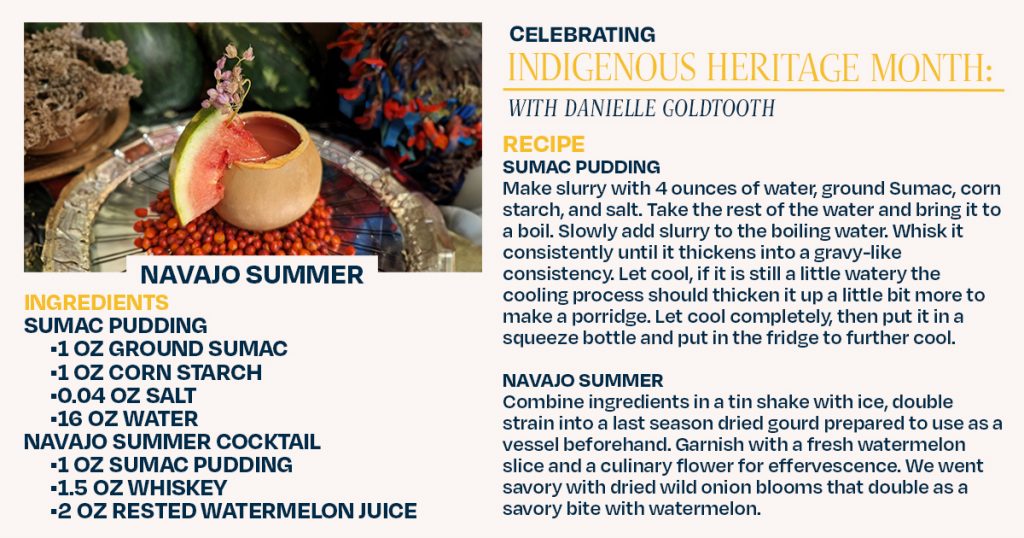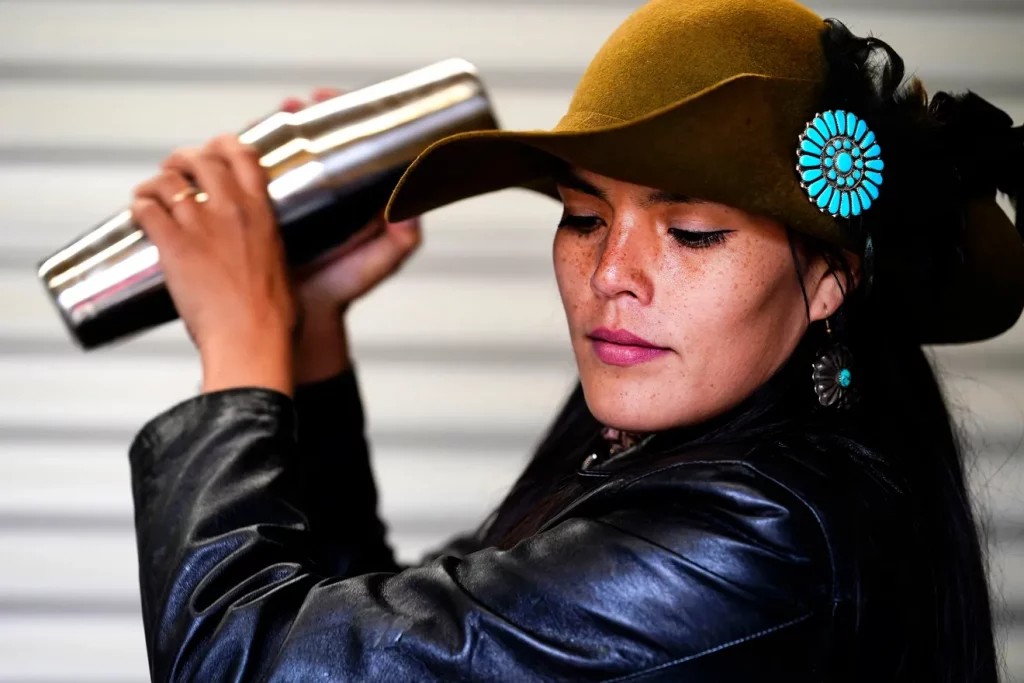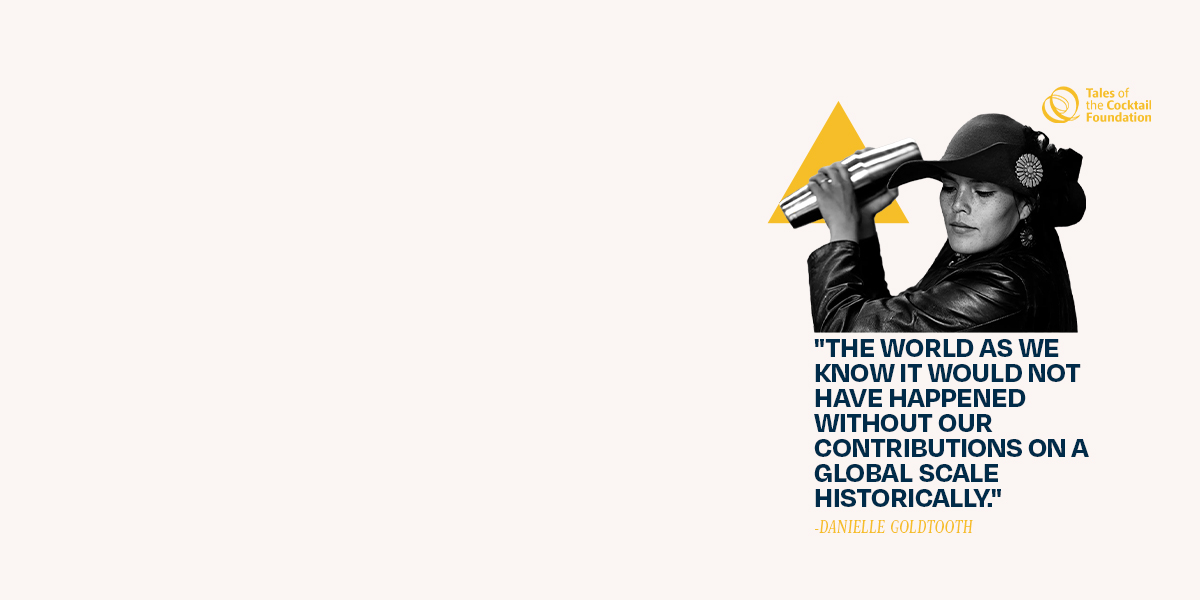As hospitality professionals, we are a community with its own culture. With that culture we have a reach that no other community has; that is part of the beauty of our industry. Within it, we have people from all walks of life, some bettering themselves by working to get to a goal and leaving, but all who walk through the doors of our institutions are forever changed by it. I have witnessed and been a part of the metamorphosis of this industry as we reach to find balance and beauty or “Hozho” as it is called in my language.
Finding that balance within ourselves and building a community is why our industry is part of global change. For a long time, I thought of alcohol as a beast that needed to be tamed, and then as a friend who understood, and now as a tool that can be welded to enhance. We get to make our own stories with this tool, to personify it as we see fit. . . In many of my communities, it is a monster, something that has historically been utilized to be a tool of destruction. A means of dehumanization and to bring forth the dismantling of entire cultures and communities. That still happens today, not just in my home community but on a broader spectrum depending on where you sit in a social class.
For others, this tool has been utilized as a way to bring people together for an exchange of ideas, an exchange of betterment, and a way to be seen in a world that we are so easily lost in. I have been a part of it and that is how I fell in love with the idea of the food and beverage industry as a community to help pave the way for social change that is necessary to build more community across the globe. The question remains how do we do this as a whole? Especially when we are disconnected through space, culture, and individualism.
In Indigenous communities across the globe, this sense of community is brought on from a young age, a sense of responsibility instilled in us for our neighbors, our relatives, and our own families. There was a goal to preserve a way of life that incorporated a love of the earth and further a respect for it while also celebrating what makes each individual unique. In this new world, I see people very far removed from that ideal.
In the community I grew up in, I remember fresh fruits and vegetables, alongside commodities provided by the government, a staple that was necessary for survival. Even with intentional buying a lot of my family’s staples came from grocery stores that were far-spread and the staples were not the best. To offset this my grandparents farmed. They farmed for us as a family and as a community. I don’t know a time they made a profit from it, they did it to preserve our culture, to lend a hand to our clan for the betterment of holistic wellbeing. It is in these fields I was able to grow and dream, not knowing that from a worldview we were poor. However, there was a time in my people’s memories of self-sufficiency. A time before government intervention and colonialism destroyed a once-thriving community. It all happened in the confines of our four sacred mountains. It happened because of this word I keep repeating, community.
Over the years with advancements in agricultural practices, these products have longer shelf lives and grow in more abundance than we can harness, leading to new problems. It’s funny to me as we veer toward a better path that we have forgotten a lot of the old techniques that were utilized to reduce waste because we used to be responsible for it on our own. Technology has advanced and we use it for our convenience rather than for betterment.
My mantra these days has been “focus on the food” as my family and I take it back to the roots. While it is overall fun and an experience that has brought forth a lot of learning, it has been more difficult than I imagined. We live in a world that has commoditized basic human necessities and getting out of that reach is damn near impossible on an individual basis or even that of a small community of people. Still, we strive forward knowing that working for our own self-sufficiency is a means of recapturing our own humanity and empathy for others. It has also brought the importance of looking for better ways to feed people with more nutrient-dense foods so that we may thrive, rather than just survive.
As we go forward and make a better community in the spirits industry celebrating our advancements, we cannot forget we are a part of something much larger. The world as we know it would not have happened without our contributions on a global scale historically. From the way it advanced travel, to the ingredients we use. We collectively hold a power on all levels of our industry and that is because of the communities we foster in each of our respective parts of the globe. We hold agriculture, we hold places that are safe places for the exchange of ideas and culture, we hold health and lifestyle, and we hold the court in some of the globe’s world leaders. With that, we hold responsibility as well. We hold the responsibility to look at the historical traumas our industry has brought, to not shy away from our part in atrocities across the globe, but also to reimagine what our world can look like while we foster new communities and culture.
I encourage each of us, from our dishwashers, bartenders, and owners to find a way to showcase the best in us. We are all striving for a “perfect service” one where our guests get to see and feel in our imagined ideal environment that is not natural in regular life. A place where time can stop and they forget their troubles of every day. A moment where everyone is on their best behavior while we put on a show of ease and relaxation despite the stress behind the scenes. It takes a group of people with a common goal to make this happen. It takes immense effort, time management, precision, and practice to get to this point. In the micro-ecosystems of our respective spaces that we choose to be in, we have a moment where we have a platform to showcase this unrealistic perfection. Utopia. This gives hope, hope of a place where our guests feel welcome, valued, and respected. To be of service in this manner can have a profound effect on people, and bring the best of them. Our work extends to how we choose to make this, our footprint as we respect our earth and preserve it for future generations to have this joy.
With this, I leave with gratitude. A hope for a better future and a hope that people will reconnect themselves in community, finding a culture that respects the individual and the earth.

The recipe for the Sumac Pudding was handed down to me from my great grandmother Rebecca Johnson. It is a type of pudding Dinè used for everyday food historically. It is one of the applications of preserving the culture to share it and hope others help caretake for the places it comes from. In time, understand the connection we all have to earth and why places Native People call sacred are important to protect. Many of these plants will not be able to have the abundance necessary to sustain our way of life if we do not. Sumac is a way of life for some people. Picking many peoples share in order to keep the viability of the plants alive but also to make up for the people who are unable to pick for themselves in this modern world. Some places we pick are very sacred and place for prayer and meditation. Be sure to check in with your local governance of public lands to see their policies on foraging, USFD and State Forestry usually have good information as well as work with local tribal entities and government because of the over lapse of sacred space on public lands. Also if it is applicable or possible look to buy from local tribal members, and small Indigenous businesses first with looking for these types of products. This ensures non-commodification of a sacred product and keeps the control with the people who have fought over a millennia to care for that land and food source.
While we have been farming and growing our own produce, the applications of the Navajo Summer cocktail is difficult for a full fledged bar operating day to day. To make this cocktail in more quantity, partner with a local farmer in the fall and winter time and talk about your envision. Having an outlet for produce planted ahead of time makes growers more likely to plant what you are wanting. Get to know your local food producers, and remember we are only as good as our ingredients!

About Danielle Goldtooth
Danielle Goldtooth is a Dinè Mother, Mixologist, Farmer, Forager, and owner of Dii IINA. The company name means “This Life” in Dinè. Danielle’s passion for sustaining people in all aspects led her on a journey of food sovereignty and finding her own “Hozhò” (Beauty and Balance). This path has taken her to relearn her Dinè agricultural heritage and continue the family farm. Currently, Danielle and her family are in the R&D phase of a new restaurant concept to support the idea of Food Sovereignty in their area. In the meantime, they do pop-up events to support their goals and continue finding allies.
Instagram:
@dii_iina_food
@danielle.goldtooth





